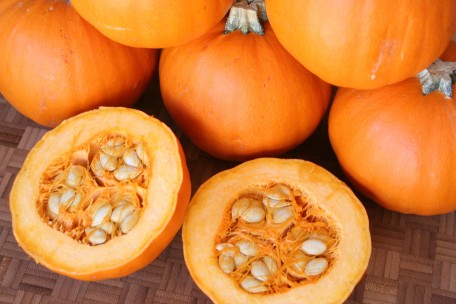News and Notes from The Johnson Center
Pumpkin: A Fall Favorite
JCCHD | Mon, November 17, 2014 |Ah, fall. It is the time of year when the air gets cooler, the leaves change color (at least in some places other than Austin), and our obsession with pumpkins reaches a new height. Pumpkin pie, pumpkin lattes, pumpkin soup, pumpkin pancakes, and pumpkin bread are just a few fall favorites. However, you may not know that pumpkins possess many health benefits.

Pumpkins are good for your vision.
Pumpkins are an excellent source of vitamin A, which aids in promoting good vision, particularly in low light, according to the National Institutes of Health. Pumpkin is full of the carotenoid beta-carotene, which converts to vitamin A and aids in maintaining vision health.
Pumpkins will keep you fuller longer, and they are good for your overall health.
One cup of cooked, mashed pumpkin contains about 2.7 grams of dietary fiber. Fiber helps keep you fuller longer, thus limiting frequent snacking and reducing the likelihood of consuming larger meal portions. This can help you achieve or maintain a healthy weight. Fiber is also good for your digestive system, as it reduces the risk of developing diverticular disease, which consists of hemorrhoids and small pouches in your colon. It also normalizes and helps maintain good bowel function.
Pumpkins are a good source of antioxidants.
Beta-carotene is also an antioxidant; and pumpkins are a good source of vitamin C, also an antioxidant. Antioxidants found from dietary sources such as pumpkins reverse the effects of free radicals in your body, which cause cell damage known as “oxidative stress,” and can reduce the risk of diseases like cancer, heart disease, Alzheimer’s disease, Parkinson’s disease, and even diabetes.
Pumpkins can help maintain normal body growth and function.
Pumpkins are a good source of potassium, containing about 12% of the recommended amount in one cup of cooked, mashed pumpkin. Potassium aids in several body functions, such as muscle growth, controlling acid-base balance, and maintaining the electrical activity in nerve and muscle cells in the heart.
Pumpkins can contribute to your overall well-being.
Pumpkin seeds are rich in tryptophan, an amino acid that is the building block for the neurotransmitter serotonin. High levels of serotonin can boost your mood and morale. It is also an important factor in regulating sleep and wakefulness—high levels of serotonin are associated with daytime, when one is generally fully awake.
Here are some recipes to try a fun, seasonal treat:
http://www.nourishingmeals.com/2011/10/grain-free-pumpkin-cupcakes.html
http://www.nourishingmeals.com/2008/11/giving-thanks-recipes-pumpkin-desserts.html
http://nomnompaleo.com/post/12318335046/paleo-pumpkin-coconut-maple-custard-cups
http://thevanityeffect.com/2013/02/nom-nom-paleo-pumpkin-cake/
http://deliciouslyorganic.net/grain-free-gluten-free-pumpkin-bread-recipe/
http://feedmephoebe.com/2013/10/the-balanced-diet-creamy-vegan-pumpkin-soup/
http://againstallgrain.com/2013/11/26/pumpkin-pancakes-bacon-pecans/
http://againstallgrain.com/2012/10/25/baked-pumpkin-doughnut/
http://againstallgrain.com/2012/10/09/pumpkin-spice-cookies-with-vanilla-cinnamon-icing/



